Comments History
-
hideVersion: 7
What I believe to be Obama's worst-case scenario.
Obama/Biden-51.7%
Romney/Portman-46.4%
Other-1.9%
This assumes that the US economy will avoid a double-dip recession. Growth plateaus and no major crises or scandals harm the Obama administration. The unemployment rate hovers between 7.9 and 8.4-ish and growth doesn't take off but doesn't dip. Romney fails to excite conservatives or persuade swing voters and many reluctantly vote for Obama because of the campaign's success in portraying Romney as a "severe" economic conservative who is aloof to working people's problems and will say anything to get elected president. The president's traditional base turns out about as strong as it did in '08 and enough "swing voters" reluctantly vote for him despite a purveying sense of disappointment in his first term.
This analysis takes into account "suspect" analysts and pollsters (who stick to older pre-2008 and 2006 models) to predict election results, which is friendlier to Romney. Many people felt that 2010 was a return to the norm and that 2012 will not look a lot like 2008. Most of these people give Obama a slimmer lead than I believe he will end up having. This analysis represents a sort of halfway point between where I believe the election is headed (which I'll do for my next analysis) and where they believe it is, which is a 2-3 point Obama PV win and an EV total near 300.
**New Hampshire should be light blue, I just don't feel like changing it.
Version: 6
Obama/Biden-52.3%
Santorum/Portman(?)-44.2%
Other-3.5%
This is just some fun. Not THAT crazy unbelievable but somewhat out there. If Santorum were to be the nominee, which probably won't happen, it's conceivable that he could take southern states and turn out religious conservatives in places like Florida and Indiana.
For this, let's say the economy stagnates again without going back into recession. Since Santorum is the nominee, he is able to narrowly win places in the South, mainly Florida somehow, Obama snags Virginia and NC again, and losing the big prize down in the corner is sort of offset by winning enough moderates in the the Dakotas and Montana to mitigate the loss, as well as Arizona. Since we're talking economic stagnation, third parties get a bigger than usual share, but not enough to have a real impact.
Possible? Sure. Likely? Not really.
Version: 5
Here's what I'll colloquially call my "Gut Feeling as of One Year Prior to the Election" map. Here goes.
Obama/Biden: 53.4%
Romney/xxx(?): 44.8%
Other: 1.8%
(I'm still at a loss for good VP picks for Romney. In this scenario, I doubt it would make much difference. What are your guys' thoughts on Sandoval from Nevada?)
For pure map stuff, scroll down past the asterisks.
So, why this? It would seem right now to be about the most counter-intuitive map someone could scramble together, but it is much more likely than the media or professional analysts are giving credit for right now.
To put it simply, Mitt Romney is vastly overrated as a general election candidate. There are a few things that seem to be grabbing the attention of *ahem* analysts and the media concerning Romney right now, which don't seem to hold up when one digs a little deeper. I'd like to offer my own busting of a few of these myths.
Mitt Myth #1: His moderate stances make him appealing to independents, which is why he is running the strongest against Obama in head-to-head heats.
-While he does appear moderate compared with virtually everyone else in the GOP field (except Huntsman), it is mostly a by-product of his time in Massachusetts. While the flip-flopper argument might not hold much water in the larger campaign discourse that will focus on the economy, it will force people, independents and conservatives alike, to question the man's motives. Is he committed to rebuilding America, to restoring a conservative vision? Or does he simply want to be president and happen to have an R next to his name?
Mitt Myth #2: His business background gives him credibility in tough economic times.
-If Romney were a John Boehner type Republican-- from a blue-collar family, a strong background working his way up the ladder in small-ish business-- I might give this one a little more credit. However, his particular "business" background carries many potential dangers. What seems to be missing from the narrative is how well a former financial executive-turned one term governor of Massachusetts who left office with low approval will fare in a general election in this climate. It's surprising that at least one other GOP candidate hasn't gone all out to drag him through the mud on this yet. Speaking of other GOP candidates...
Mitt Myth #3: Romney is showing how ready he is for the general election by being poised, consistent, and level-headed, especially during the debates.
-Oh, how much we've heard about Romney's debate performances. Fortunately for Romney, all he has to do to maintain his place in the polls is sound somewhat coherent during the debates (unlike Perry) avoid statements that get you front page status on HuffPo or on the CNN ticker for their inflammatory nature (Looking at you, Bachmann and Paul) avoid pissing off the conservative establishment and having your staff exit en masse (Gingrich and Bachmann sort of)and not have a sexual harassment scandal break and change your story on it three times a day (Cain, but it doesn't seem to be hurting him that much--yet).
The conservative candidates actually seem to be more intent on destroying each other rather than going straight after Romney. It isn't because they revere his political dexterity. They are all vying for the same spot on the same belief: whoever can become the not-Romney can top Romney. Right now, Bachmann attacking Romney probably benefits Herman Cain. But the worse she can inflict damage on Cain or Perry or Gingrich, the more her own stock as the not-Romney will go up. The same goes for the other four or five not-Romneys.
Romney's absence of a huge mistake so far (or at least one that the rest of the GOP field has failed to exploit) is far from a guarantee of his general election performance.
************************************
Now, as for the map:
This is a map where obviously much breaks the President's way. Mitt Romney's deficiencies as a candidate emerge slowly at first but by the time the conventions are over have made themselves manifest. Flip flops, questions of priorities and perhaps an impression that lack of conviction will mean that President Romney would be not much more than a rubber stamp for the Tea Party Caucus. Something like the argument against John Kerry seven years ago, plus the Congressional mule angle.
This is thrown in with economic progress on par with or slightly better than the news we got this past Friday, and a sense of buyers' remorse among conservatives. Barack Obama reprising his true role as campaigner-in-chief leads to a hard-fought but big win for the President, relying on solid turnout from his base and a distaste for Romney among independents and especially women, similar to what helped Bill Clinton rout Bob Dole in '96.
For this map, I have picked out 10 true swing states, the gray ones on the Confidence Map.
Arizona: If Obama wins this state, it will mean a blowout like the one hypothesized in this map. The last PPP poll in AZ had Romney up by four and the President beating all other challengers. This map implies at least a five-point swing against Romney in most, if not all, of the swing states. A narrow win for Obama, 2 points or less.
Florida: Another that has razor-thing margins between Romney and the President. This state *might* lean GOP with Rubio on the ticket, but that seems highly doubtful. A marginal but clear win for Obama, 2-3 points.
Georgia: Similar to Arizona--if Obama wins here, it is over for Romney before it really begins. The last PPP poll way back in April had Romney three points ahead of the president, but a lot has happened since then and as of this moment, Romney's margin is probably bigger. For the purpose of this map, though, a win very similar to Obama's '08 win in North Carolina.
Iowa: Polls show it being close here. Iowa voters like their Republican governor and are pretty sour on Obama. However, the Obama ground game in the state, while somewhat dormant now, is hardly extinguished. Look for a somewhat narrower win than the one in '08 but a win nonetheless, riding on the back of solid turnout numbers in the eastern half of the state. ~5% margin for Obama.
Missouri: Another close state, with a reasonably popular Democratic governor and a vulnerable Senator up for re-election next year. It was hard for Obama to win this state with the wind at his back in '08, and unless there is a groundswell that makes 2008 look small, expect the Obama campaign to divert greater resources elsewhere. Missouri goes red (or blue or whatever) by 2-3 points.
New Hampshire: Goes down to the wire until the last few weeks. The Republicans are forced to defend places like Arizona and Georgia, and the state's demographics land it in the Democratic column by 7-8 points.
North Carolina: A cornerstone on the Obama camp's various roads to 270. The infrastructure is in place to make this state, along with Virginia, Colorado, New Mexico and Nevada the Democrats' firewall so to speak, the most reinforced path to 270. More options with resource allocation will allow for a post-Labor Day push and a 2 or 3 point win.
Ohio: The mother of all blue-collar bellwethers. While this state will still be extremely important in '12, it's worth wondering what its electoral influence will be in the future, with population shifts away from the Midwest and Northeasat to the West and South. It is only a 2 EV difference, true, but if Obama were to lose Ohio and Wisconsin, but somehow pick up Georgia and Arizona, It would only be a loss of a single electoral vote. In 2008, the same swap would have lost five. In a potentially close race as many are predicting, this has huge implications. In this scenario, however, depressed conservative turnout and strong turnout in urban areas and the "backwards C" akin to 2008 gives Obama a 3-4 point victory.
Virginia: Another "economics vs demographics" question. I have heard some Republican strategists speculate that the state had a distinctly pro-Democratic bent in 2008 that helped Obama win, but now that a popular GOP governor is in Richmond and the state Senate is likely to flip from Dem control, that brief moment in the state's behavior appears over. For every Republican arguing this, there is a Democrat arguing that state politics don't have much to do with national elections, Obama is very competitive in trial heats so far, and Democrats like Tim Kaine and Mark Warner remain popular. Both sides have polling data to back up their claims. The big question is Democratic turnout, especially in counties like Prince William, Arbermale, Loudon, Westmoreland, and half a dozen others that flipped in '08 and/or where Obama ran up the score on McCain. In this map, the final tally greatly mimics the national PV totals.
Wisconsin: A state I truly believe will not flip no matter who wins. It has gone Democratic in every election since 1988 and the state Democratic Party is fired up and itching to deliver a good punch. Recent polls have shown a narrow gap between Romney and Obama, but unless this election turns into a massive GOP victory, I expect Obama's margin of victory here to be at least 1 or 2 points.
Well, there it is. As always, I welcome your thoughts, especially on the Sandoval as Veep question. He seems to me to be a less controversial alternative to Rubio who can help make important inroads for Republicans in the West. What I have read of him, he seems to be an extremely intuitive politician and not one who is likely to provide a fundraising boost for Democrats like Rubio would.
If I can resist the temptation, I won't be doing another analysis until the primary season is in clearer focus, but I might have to cave sometime before then and do one or two maps for fun.
Version: 4
This one might be a little more controversial. The "closest" possible race with Obama still beating Romney. Why? Presidents just don't win close re-elections without increasing their margin from their original election, but I am willing to entertain the possibility in this case. I have heard many smart friends and colleagues make the case (which I will elaborate on in a later post or in the comments if anyone presses me enough ;) ) for why this will be an election to throw out the record books.
That being said, I think this is just about the closest we will see it if Obama pulls off a win. I also only really see this sort of scenario happening if a) a string of good economic news--unlikely--comes out during the late summer/fall but many voters have already made up their minds to vote for Romney or b) Romney is leading closely as in the last map and some sort of foreign or security crisis emerges, Mitt has a response similar to McCain's toward the financial crisis, and a small but potent portion re-aligns with Obama.
Mitt is alsoextremely unlikely to make a disastrous VP choice, in my opinion. There is also what I think is a very slim possibility: that superior campaign operations and messaging somehow miraculously better than anything this White House has so far produced push Obama over the finish line.
Again, more people than in 2008 vote 3rd party
The PV for this map:
Obama/Biden: 50.4%
Romney/McDonnell(?*): 46.9%
Other: 2.7%
Some stuff on the states:
NM & NV--similar to Harry Reid's 2010 campaign, (but without the benefit of a Sharon Angle-like opponent), Obama wins these states on the Hispanic vote.
VA & NC--An intense focus, and those demographic shifts everyone wants to talk about pull the president through.
OH & PA-Bound to be the most controversial picks of mine, IMO. Although these states have been too hard hit by the recession for foreign matters to have much weight, a string of good economic news would be played ad nauseum here by the Democrats and Romney talks himself into a bad situation. Voters are tired of both parties. Enough swing voters and Democrats pull the president by a hair in Ohio and a 3-5 pt margin in Pennsylvania.
New Hampshire is fought for tooth and nail, but like NC and VA, demographics trump economics.
Version: 3
This is the first of a two-part scenario, the "close race" Obama vs. Romney.
PV
Romney/???-49.5%
Obama/Biden-47.2%
Other-~3.3%
My first prediction was for Obama vs Perry, with 2008 as the main reference point. Now that Perry's lone star is fading (get it?) a bit, I could very well be wrong about Perry's easy walk to the nomination, although I stand by my unpopular opinion that Perry is the better general election choice over Romney. Romney has shown a surprising amount of endurance on the campaign trail, and a very impressive ability to stay on message and not buckle under pressure. While his road to the nomination is anything but certain, as of this moment it is the most likely scenario.
In this general election scenario, the campaign has centered around Obama's perceived mismanagement of further economic downturn. The Obama campaign in this circumstance barrages Romney with charges of flip-flopping and, what I believe to be Mitt's biggest vulnerability, his past as a financial executive and his unpopularity in the state he once governed, much less the "poor" job creation numbers in Mass. under his tenure. The Democrats also pour an immense amount of money and energy into turnout operations and focusing intensely on specific states. However, these efforts fall just short of being effective enough for Obama to keep his job, as another year of economic hardship has rendered #44 incapable and desperate in the eyes of a large enough plurality to cast votes for Romney.
Many more people vote for smaller parties than in 2008, but ultimately, although frustration with both parties is astronomically high, a viable third party fails to emerge and the incumbent bears the brunt of the electorate's negativity.
***PS***
I don't have a running mate for Romney here, so share your thoughts on who is a likely choice.
Version: 2
Obama vs Perry (scroll down if you wish to skip the political analysis and want to go straight to talking about the map)
This past week, James Richard "Rick" Perry has overtaken Willard Mitt "Mitt" Romney as the front-runner in the polls for the GOP nomination. Given Perry's meteoric rise, it would appear the Romney people are going to have a choice to make: go on the offensive against Perry and very possibly tack to the right to try to make some inroads in the conservative vote, or stick to their message and try to sell Romney as the business candidate who can appeal to moderates and go toe-to-toe with Obama on the economy. Both options present difficulty for the Romney camp.
On the former, many conservatives simply don't trust Romney: why would they go for a candidate who has gone back and forth on conservative principles over the years when Perry has shown steadfast loyalty to the cause? And why, for that matter, go for a one-term governor of smaller, more liberal Massachusetts over a three-term governor of Texas, that enormous conservative haven?
On the latter, Romney doesn't have any real qualifications creating jobs. The big skeleton in the closet from his stint in the governor's mansion in Boston is Massachusetts' low ranking in job creation numbers. There is also RomneyCare, but I'd hardly call that 'in the closet' at this point.
The big skeleton in his closet from Bain Capital is a (supposed) reputation for layoffs and focus on profits at the expense of the mid to low-level workers-and we all know how well a big-time, layoff-enamored financial executive would fare in the minds of working and middle class GOP primary voters, let alone general election voters. It is possible, then, that what the Romney campaign viewed as its biggest asset might turn out not to be so.
And if the image of Romney as an out-of-touch millionaire becomes part of the attack line against him in the race for the nomination, the argument for him as the better general election candidate over Perry could be gone as well.
So, if things stay on their present course and Perry rickrolls to the GOP nomination, what does an electoral map against Obama look like? It's hard to say. On the one hand, voters could tune in to the bottom line: that Rick Perry has created jobs and Barack Obama hasn't. Certainly the Obama campaign will fight tooth and nail to keep this from becoming the narrative, but whether they can is a big 'if' that depends heavily on the unemployment rate and the state of the economy at this time next year.
On the other hand, Rick Perry has never run a national campaign, and unseating any incumbent is always a difficult task, especially if said incumbent has the impressive campaign machinery the Obama people built in 2008, and by their own accounts still have intact and ready to go for next year.
It is also entirely possible that Rick Perry finds himself outside the mainstream and unable to overcome past (or future) extreme-sounding comments and that Obama is able to effectively paint Perry as an out-of-touch right-wing evangelical, an unwelcome relic after so many voters still have a bad taste in their mouth from another governor of Texas who ran for the White House.
It is, all things considered, difficult to tell if Americans will give a damn about region, dialect or ideology if the unemployment rate is still at 9% and the country is in the midst of yet another recession.
*****
As for the actual map, I still am more inclined to stick with 2008 as a starting point and going from there. Green, as with some other maps, represent toss-ups, or more accurately, states where it seems just too early to tell.
If this thing turns into a landslide for Obama, I'd expect most of these to go red (blue on TV). With such high unemployment, the big three of Ohio, Pennsylvania, and Florida would be tough for the president to carry, and the Republicans made significant gains there, including the governorship in all three states, in 2010. That being said, the governors there appear to have even worse approval ratings than Obama himself, which could turn out to be very beneficial to the president. (Note: current occupant of the governor's mansion in a given state has little to no effect on the state's vote for president, this is just meant as a metric to test a state's current political sentiments)
It may surprise some that Virginia and Iowa are in the too early to tell/toss-up category while North Carolina is now in the Democrats' column. The Obama campaign seems very intent on carrying NC in '12, as well as Virginia. The decision to hold the convention in Charlotte as opposed to a larger, more iconic city like St Louis reflects this ambition. The state seems to be trending Democratic, and there has been some evidence (few and far between as its been) that the president is faring better there than in many other battleground states.
Important note: My analysis is obviously not meticulous about cold hard data and fusing together all the math. Plainly and simply, I'm not a math person. This prediction, and probably most of my others, will reflect mood and political intuition-considered talking-head BS by some, but I am of the opinion that these must be intuitively read and studied because it is the math that follows the mood.
My preferred method has always been to make educated guesses based on political currents, the less analytic aspects like message effectiveness and candidate appeal, and good old-fashioned gut instinct. The data and math will follow the way these 'intangibles' affect the race, as well as outside events such as the economy or foreign crises.
Please be respectful, civilized and reasonable.
Version: 1
Best case scenario for Obama. It's always been my gut feeling that if he does pull off re-election, it will be a big win, but if he gets unseated it will be close-2 or 3 popular vote points, 10-30 EVs. I'm a believer in the "cruise or lose" principle-in other words, I think it's more likely that he loses than gets re-elected with a smaller margin than the one he had in '08.
If you're here to comment to spew partisan babble and not be thoughtful, please don't bother.
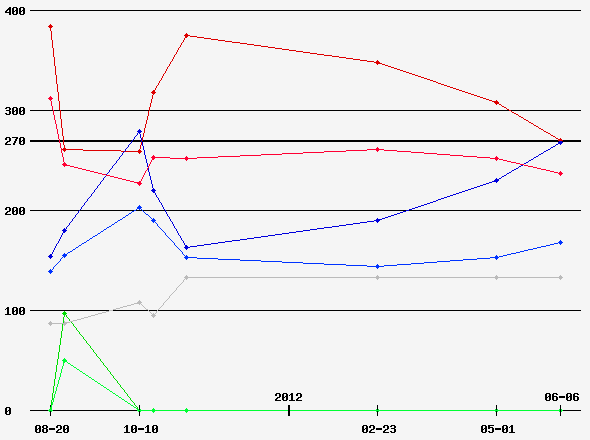





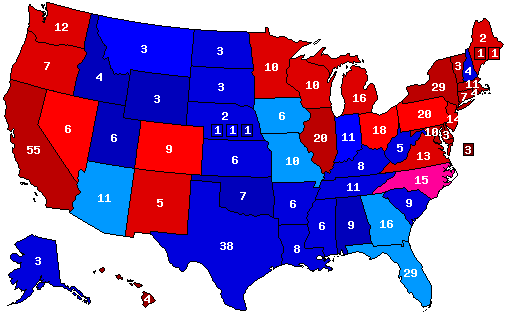
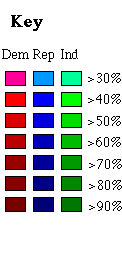
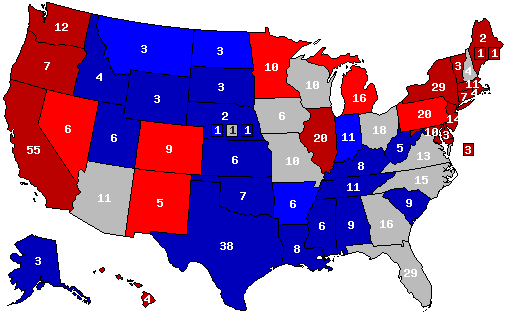
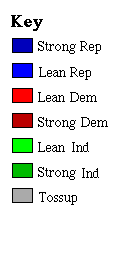
 2014 Senate
2014 Senate 2014 Governor
2014 Governor 2012 President
2012 President

